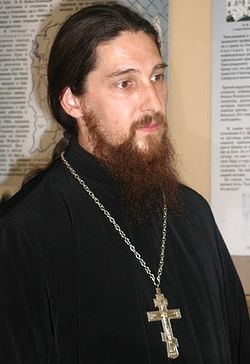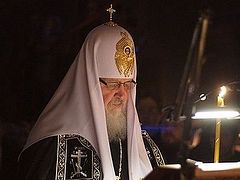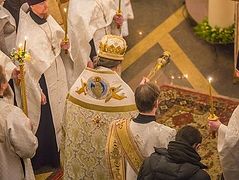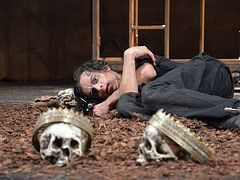The First Week of Great Lent: Pastoral Advice. Part 1
Fr. Dimitry Shishkin, cleric of the Church of the Three Holy Hierarchs, Simferopol:
Lent is a time of conscious effort, which helps us acquire another view on the world—that which the Lord calls the Kingdom of God within us. We know the Greek word “metanoia”—“repentance”—literally means “change of consciousness.” Man is called to a transfiguration of his own life. It is no accident that the Gospel preaching of Jesus Christ begins with the words, Repent: for the Kingdom of Heaven is at hand (Mt. 4:17). But sometimes we don’t completely understand what repentance is. We think it’s a brief event of the inner life, a moment of contrition for sins, beyond which lie ordinary days and our usual routine. Of course, such “sudden” repentance is a gift from God, and it is capable of inverting the structure of the human soul. But repentance can also be understood as a path of gradual, patient transformation of life. And this path is impossible without fasting.
This is what’s important to understand: Lent is not only, and even not so much abstinence from non-fasting food. There are people who don’t eat meat at all, and there are those who abstain from food for the sake of physical beauty, and there are those who eat sparingly due to scarcity of funds. The former usually say: “Oh, my whole life is one unending fast!” But here’s the thing: Fasting is voluntary abstention from everything that prevents you from drawing near to God, and it’s not meat, of course, but our passions, of which gluttony is but one of them. We are fascinated by things that often we simply don’t pay any attention to. For some that’s turning off the television for a couple of months, or not playing computer games or listening to music—that’s a podvig in no way smaller, and maybe even bigger than the refusal of meat. Everyone has his own weaknesses and propensities that not only weaken the soul, but peg it to the ground. The soul loses its taste for the spiritual life and becomes, if I may say so, “carnal.” It gets used to a number of comfy sweets, and in these sweets loses the memory of itself and of its Heavenly calling.
People usually bring long “scrolls” of sins to Confession at the beginning of Lent, issued from penitential books. But besides such extended confessions, it would be good for each person to identify a few of their main sins—that which especially hinders you from drawing closer to God. Perhaps it’s anger, or an inclination towards judging, idle chatter… Everyone has his own. Noting these sins, paying special attention to them, you can begin to fight them with God’s help.
Any battle with sin begins with attention to yourself, to your inner life. When the Lord calls us to “watch” (Mk. 13:37), He’s talking specifically about this heartfelt attention. Satan manifests himself to man through the sinful movements in his soul, called “suggestions.” If a man is attentive to himself and knows what he intends to fight with, then he will not miss these moments of flashes of sinful thoughts and feelings in the soul. Then begins the real war. We must firmly reject these suggestions, not agree with them, and say in our souls: “I don’t think that, and you, Satan: Depart from me!” Moreover, the stronger the “attack” of the sinful thoughts and feelings, the more attentive and earnest must be our prayer. In such strong passions, such as anger, lust, pride, everything happens very quickly—in a split second the soul ignites with a sinful feeling. St. John of Kronstadt advises: “The speed of the enemy’s attacks is opposed by the speed of the mind and heart’s turning to God, not allowing yourself for even a moment to enjoy his deception, but casting your gaze upon the Lord.” In such moments there is no place for reasoning—you just have to pray, and the most fitting are short prayers like “Lord, have mercy!” which you can repeat many times. In general, when the soul is inflamed by a sinful feeling or a storm of sinful thoughts, you must give yourself wholly into the hands of God.
A man often falls into despair from the attacks of sinful thoughts and feelings. But you should know that at the appearance of a suggestion in the soul, no matter how absurd and vile it is, there is no sin yet. This is how Satan acts on the soul. And if someone decisively rejects this vileness, there is no sin, no matter how long this violence against the soul lasted and no matter how fierce it was. This internal battle is necessary for the purification of the soul, for confirmation in faith, and is possible for a man anywhere, wherever he may be—whether at home, at work, or on the street.
It is surprising, but failures, defeats in this fight give a man an undoubted benefit, in that they allow him to know his weaknesses experientially, and come to a broken and humble state of spirit, when man understands that without God he truly can do nothing.
So, the soul gradually develops the habit of an active battle against sin. This battle is difficult, but without it, the meaning of fasting is lost: the transfiguration of the soul, the acquisition of grace, the attainment of unity with God.
* * *
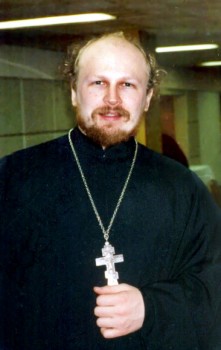
The meaning of any fast is self-restraint, that is, the voluntary refusal of a significant part of our earthly, sensual lives. In this sense, the first week doesn’t differ from the rest. Its importance is in that it is a time of transition—of acclimation to the fasting regime, therefore, you can spend it more strictly than the whole Lent, so fasting would then be easier. But the measure of strictness, everyone should define for himself in consultation with his spiritual father. Zeal for the podvig of fasting should be combined with humble consideration of the measure of our abilities. Our own measure should arise from the combination of zeal and consideration. We mustn’t orient ourselves according to fashion or the advice of a neighbor. Naturally, we should be guided by the demands of the Church and not allow ourselves to frivolously relax, willfully weakening the fast, supposedly because of the impracticability of the Church’s requirements. It’s now fashionable to give yourself a break, and argue about the impossibility for our weakness to fully fast. If we a priori accept the Fast with such an attitude, then nothing will work out. If you ask God for help, that He would grant you to pass through the field of Lent successfully with reason, then everything will work out. Finding your measure of abstinence is one of the most important tasks of Great Lent.
It is important during Lent to limit the informational impact (television, internet). Such restraint often becomes more difficult than the limitation of food. As for our cares and concerns, we often multiply them for ourselves. We can safely forget about some of them during Lent.
And most importantly, I believe, is to give yourself the task during Lent of overcoming some specific sin, even if its small. Without this, Lent goes by in vain. You can set a schedule of reading for yourself during Great Lent—for example, to read part of Holy Scripture, some book from the ascetic works of the holy fathers—for example Abba Dorotheos, St. Ignatius (Brianchaninov), or St. Theophan the Recluse. Lent should be a time of familiarizing yourself with reading Patristic literature.

